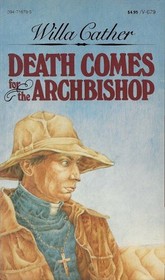Helpful Score: 3
This classic by Pulitzer Prize winner Willa Cather was written in 1927. It was a book chosen for our Book Club and I would not normally have chosen a book such as this to read. The story takes place in the 1850's when the New Mexico Territory has just been acquired by the United States. Two french clergymen, The Archbishop and his Vicar, travel from Ohio, but they were originally from France, to undertake the near impossible project of spreading faith and religion among the various Mexican and Indian settlements that dotted the dry, arid countryside. The author's strength is in her detailing of the scenery and her peaceful, serene narrative. One book club member described it as "Painting a picture".
There is little plot, but more a series of short stories which share the 2 religious men's experiences among the native people. What I liked about it is the respect and admiration the author, hence the 2 religious men, have towards the natives so that they are not trying to press their faith on anyone, but enhance and help where and when they are needed. The natives then seem to share an equal respect with the 2 Frenchmen.
I enjoyed the book and it did make me feel relaxed and calm whenever I picked it up. I can't say, however, that it was a real page-turner or that I couldn't put it down. It's just not enough my style of book.
The ending however (about the last 50 pages) get a lot more interesting as everything is brought together as the Archbishop is dying. I found that I read these last pages all at once without putting the book down and was thoroughly captivated. (And no, it wasn't because we had our book club meeting the next day either - ha ha!)
ABOUT THE AUTHOR: Willa Cather was born near Winchester, Virginia in 1873.When she was 10, her family moved to the prairies of Nebraska, later the setting for a number of her novels. At the age of 21 she graduated from the University of Nebraska and spent the next few years doing newspaper work and taching high school in Pittsburgh. In 1903 her first book, April Twilights, a collection of poems, was published, and two years later The Troll Gardens, a colection of stories, appeared in print. After the publication of her first novel, Alexander's Bridge, in 1912, Cather devoted herself fulltime to writing, and, over the years, completed 11 more novels (including O Pioneers!, My Antonia, The Professor's House and Death Comes to the Archbishop), four collections of short stories, an two volumes of essays. Cather won the Pulitzer Prize for One of Ours in 1923. She died in 1947.
There is little plot, but more a series of short stories which share the 2 religious men's experiences among the native people. What I liked about it is the respect and admiration the author, hence the 2 religious men, have towards the natives so that they are not trying to press their faith on anyone, but enhance and help where and when they are needed. The natives then seem to share an equal respect with the 2 Frenchmen.
I enjoyed the book and it did make me feel relaxed and calm whenever I picked it up. I can't say, however, that it was a real page-turner or that I couldn't put it down. It's just not enough my style of book.
The ending however (about the last 50 pages) get a lot more interesting as everything is brought together as the Archbishop is dying. I found that I read these last pages all at once without putting the book down and was thoroughly captivated. (And no, it wasn't because we had our book club meeting the next day either - ha ha!)
ABOUT THE AUTHOR: Willa Cather was born near Winchester, Virginia in 1873.When she was 10, her family moved to the prairies of Nebraska, later the setting for a number of her novels. At the age of 21 she graduated from the University of Nebraska and spent the next few years doing newspaper work and taching high school in Pittsburgh. In 1903 her first book, April Twilights, a collection of poems, was published, and two years later The Troll Gardens, a colection of stories, appeared in print. After the publication of her first novel, Alexander's Bridge, in 1912, Cather devoted herself fulltime to writing, and, over the years, completed 11 more novels (including O Pioneers!, My Antonia, The Professor's House and Death Comes to the Archbishop), four collections of short stories, an two volumes of essays. Cather won the Pulitzer Prize for One of Ours in 1923. She died in 1947.
Helpful Score: 2
The story tells that of a single human life, lived simply in the silence of the desert. In 1851 Father Jean Marie Latour comes as the Apostolic Vicar to New Mexico. What he finds is a vast territory of red hills and tortuous arroyos. American by law but Mexican and Indian in custom and believe. In the almost 40 years taht follow, Latour spreads his faith the only way he knows -- gently, although he must contend with an unforgiving landscape.




